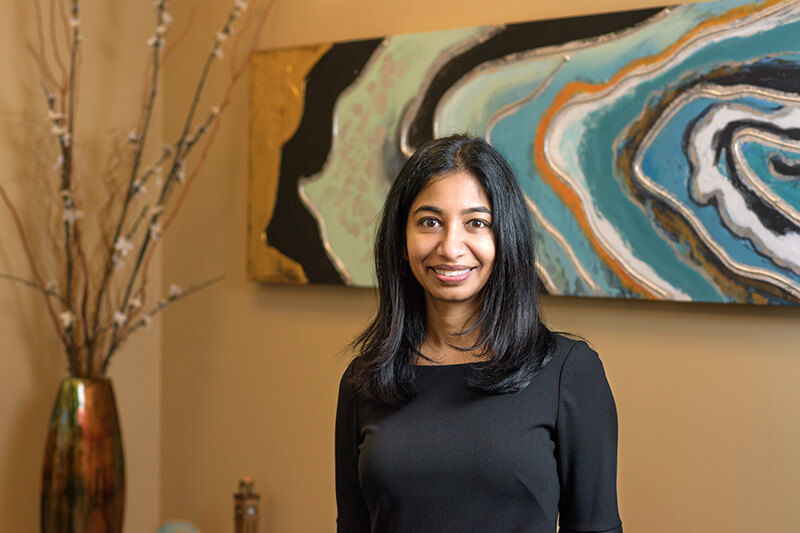December 15, 2020
‘Tis the season to resolve to quit smoking and save your voice
 Quitting smoking not only can improve one’s lung and heart health, but also one’s vocal fold health, says Preeti Sivasankar, professor and head of Purdue’s Department of Speech, Language, and Hearing Sciences. (Purdue University photo/Rebecca McElhoe)
Quitting smoking not only can improve one’s lung and heart health, but also one’s vocal fold health, says Preeti Sivasankar, professor and head of Purdue’s Department of Speech, Language, and Hearing Sciences. (Purdue University photo/Rebecca McElhoe)
WEST LAFAYETTE, Ind. — A Purdue University speech scientist says those who resolve to quit smoking in 2021 could reduce the damage being done to their voice.
Preeti Sivasankar, a professor and head of Purdue’s Department of Speech, Language, and Hearing Sciences in the College of Health and Human Sciences, says smoking can cause the human voice to sound rough, deep and scratchy.
“Individuals who have a long history of smoking show vocal fold tissue changes. Long-term smoking is associated with cancer of the larynx,” she says. “Although the voice may improve with surgery, smoking cessation and voice therapy, it is unlikely that it will return to the way it sounded before smoking. Dysphonia – voice problems – can have a devastating impact on one’s quality of life, so early cessation of smoking and vaping can lead to maximal vocal preservation.”
It is that vocal preservation that Sivasankar encourages smokers to consider.
“When the vocal folds are exposed to cigarette smoke, it can lead to a condition known as Reinke’s edema,” she says. “In this condition, the vocal folds get inflamed and their mechanical properties change, which in turn affects how easily the vocal folds can vibrate.”
A healthy vocal fold can vibrate up to 1,000 times a second.
“We don’t live in sterile environments. The vocal folds are constantly exposed to various airway pollutants from the environment and irritants from the body such as acid reflux,” Sivasankar says. “These may all interact with each other. Typically, speakers who smoke will first report changes in how their voice sounds, but the tissue changes have already occurred.”
Sivasankar and her interdisciplinary research team explore why speakers experience voice disruptions from prolonged speaking, aging, environmental exposures and disease. She has received funding from the National Institutes of Health to look deeper at the effects of pollution, reflux, dehydration and exertion on vocal fold health.
About Purdue University
Purdue University is a top public research institution developing practical solutions to today’s toughest challenges. Ranked the No. 5 Most Innovative University in the United States by U.S. News & World Report, Purdue delivers world-changing research and out-of-this-world discovery. Committed to hands-on and online, real-world learning, Purdue offers a transformative education to all. Committed to affordability and accessibility, Purdue has frozen tuition and most fees at 2012-13 levels, enabling more students than ever to graduate debt-free. See how Purdue never stops in the persistent pursuit of the next giant leap at https://purdue.edu/.
About Purdue University Department of Speech, Language, and Hearing Sciences
Purdue SLHS is a top-ranked department (No. 3 in Speech-Language Pathology and No. 9 in Audiology; U.S. News & World Report) with research and clinical efforts to mechanistically investigate and treat a variety of hearing, speaking, language, and swallowing disorders. Its state-of-the-art research and clinical laboratories facilitate cutting-edge scientific discoveries and a committed engagement with citizens of Indiana through top-quality clinical service delivery. The department supports stellar education of its students through four pre-eminent degree programs. Visit https://www.purdue.edu/hhs/slhs/ to learn more.
Writer/Media contact: Matthew Oates, 765-586-7496 (cell), oatesw@purdue.edu, @mo_oates
Source: Preeti Sivasankar, preeti@purdue.edu
Journalists visiting campus: Journalists should follow Protect Purdue protocols and the following guidelines:
- Campus is open, but the number of people in spaces may be limited. We will be as accommodating as possible, but you may be asked to step out or report from another location.
- To enable access, particularly to campus buildings, we recommend you contact the Purdue News Service media contact listed on the release to let them know the nature of the visit and where you will be visiting. A News Service representative can facilitate safe access and may escort you on campus.
- Correctly wear face masks inside any campus building, and correctly wear face masks outdoors when social distancing of at least six feet is not possible.
Related news release
Winter and COVID-19 bring new challenges to preserving vocal health this time of year (Dec. 1, 2020)
Note to journalists: An image of Preeti Sivasankar is available on Google Drive. Sivasankar is available for phone or web-based video interviews. Please contact Matthew Oates at oatesw@purdue.edu for information. Journalists visiting campus should follow visitor health guidelines.

